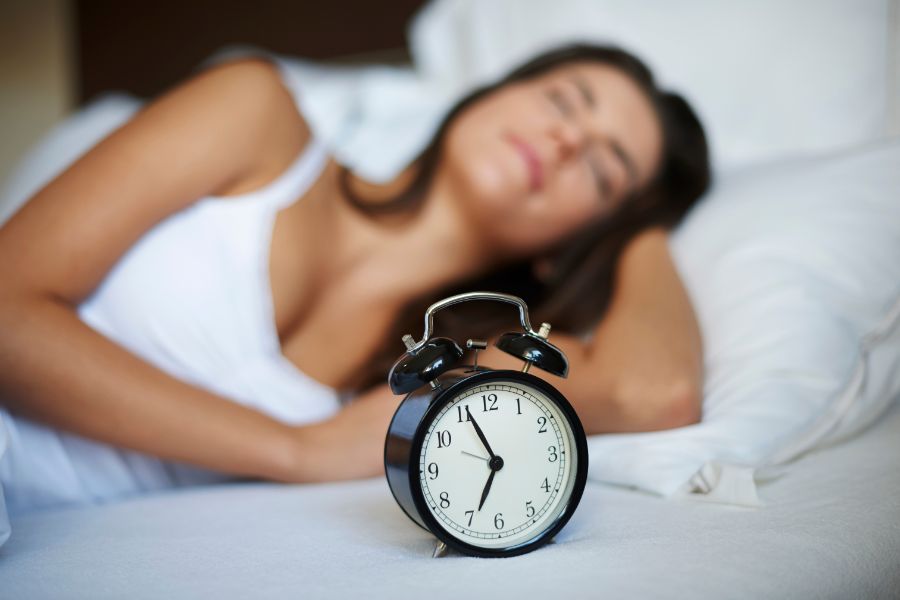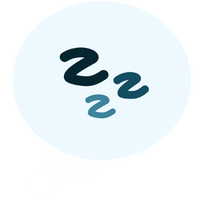After a long day of dealing with work demands and home responsibilities, all you want to do is catch a good night’s sleep.
But how many hours of sleep do you need to wake up feeling rested and ready for a new day? Is it 7 hours, 8 hours, or 9 hours?
According to the National Sleep Foundation, adults from 18 to 73 years require 7 to 9 hours of sleep. But remember, people have different sleep needs. While some can function with only 7 hours of sleep, others require 9 hours or more.

Today, however, we will direct our efforts towards 9 hours of sleep. Is it the game-changer that you need? Or is it too much?
Well, stick with us as we unlock the secret of 9 hours of sleep and help you determine if you need it.
Why Do I Sleep For 9 Hours?
Here’s the thing: If it’s normal for you to sleep for 9 hours and it’s not causing you any problems, then there’s no need for concern. You are simply meeting your body’s sleep needs.
“Sleep needs” refers to the amount of sleep an individual requires every night. Put it like this, everyone requires a certain amount of sleep to facilitate the proper functioning of the body and mind.
However, your sleep needs might change with age and stage in life. For instance, studies show that teenagers require more sleep than older adults (about 8 to 10 hours). Besides age, sleep needs might vary between people due to factors like genetics, and lifestyle.
In your case, you need 9 hours of sleep to feel and perform your best every day. Nevertheless, there are other reasons you might sleep for 9 hours, including:
Dealing With Sleep Debt
Not meeting your sleep needs over a series of days causes sleep debt to build up. Sleep debt is the amount of sleep you owe your body.
For example, an individual who needs eight hours of sleep but only gets six hours would accumulate 2 hours of sleep debt that day. If the person spends the next 5 days getting six hours of sleep, his (or her) sleep debt will increase to 10 hours.
As sleep debt accumulates, your body functions and brain functions deteriorate. Even worse, it increases your risk of health conditions, like hypertension, stroke, diabetes, and heart disease.
Sleep debt is also linked to unexpected weight gain, increased risk of falls (and accidents), impaired immune function, and other problems.
To reduce the effects of sleep debt, your body will force you to take naps during the day or sleep for longer hours at night. Sometimes, it might take several nights of long, good-quality sleep to pay the debt owed. This rings true, especially if you have a higher debt.
You’re Recovering from Intense Exercise
Exercises are good for your body and mind and it can also improve your sleep quality. At moderate levels, workouts increase the amount of slow-wave sleep you receive at night. Sufficient slow-wave sleep or deep sleep gives your body and brain a chance to rejuvenate.
On the other hand, intense workouts like running a marathon lives your body feeling exhausted. As a result, you might need more hours in bed (than your regular amount) to heal and recharge your body.
The additional hours of sleep support muscle recovery reduce physical fatigue and boost mental energy.
You’re Sick
When studying roundworms, scientists discovered the worms release a chemical that signals their brain to fall asleep when they’re sick. The same applies to humans.
When you’re sick, your cells are under so much stress. As a result, the body slows and induces sleep to provide your immune system with time and energy to fight off the sickness. Sleep also prevents exposure to external influences that can worsen the disease.
So, if you’re sick, don’t be alarmed if you sleep for 9 hours or more. You need extra sleep to restore your cells and repair damaged tissues, which helps you recover quickly.
People dealing with sleep disorders like hypersomnia can sleep for 9 hours or more. This medical disorder forces people to experience abnormally long sleep periods at night and extreme sleepiness throughout the day.
Besides that, individuals with this condition might experience low energy levels, memory problems, and anxiety.
If you suspect that a sleep disorder is the culprit behind your extended naps, talk to your healthcare provider.
Is 9 Hours of Sleep Too Much?
As mentioned earlier, your sleep needs vary throughout your lifetime. It depends on your lifestyle habits, age, activity levels, and general health.
Let us clarify this further:
If you’re dealing with stress, anxiety, depression, or an illness, your body might require additional hours of sleep. By increasing your sleep need, your body can address the negative impacts of these situations.
But here’s something you didn’t know:
Between 1970 and 2007, the percentage of individuals sleeping for nine hours or more increased from 28% (in 1985) to 37% (in 2007). This contradicts the notion that we live in a sleep-deprived society.
That said, if your sleep need is 9 hours, you’re getting the right amount of sleep. However, if your body requires only 8 hours of sleep, then 9 hours is too much.
What’s the worst that can happen?
Both short and long sleep durations of sleep can be harmful to your health. A short duration here refers to less than 7 hours of sleep, while a long sleep duration is more than 9 hours. So, the ideals sleep time ranges between seven to nine hours.
A study conducted in 2020, discovered that getting too much sleep at night can reduce your self-related health status from 6% to 10%. However, this status could also be contributed to poor diet or bad lifestyle habits, not sleep.
Research also links sleeping too much with other issues, including:
- Higher mortality rates
- Persistent depression
- Diabetes
- Alzheimer’s disease
Benefits of Sleeping for 9 Hours
Imagine waking up with a rejuvenated mind, ready to tackle the new day. Well, nine hours of sleep makes this possible.
Research conducted on 30 participants showed that individuals who sleep for 9 hours have the highest productivity ratings. That’s because sufficient rest enhances cognitive function, improves memory and attention, and boosts problem-solving skills. As a result, it takes your brainpower to newer heights.
But that’s just the tip of the iceberg: More sleep translates to better health, such that, it reduces the risk of developing obesity. How?
Well, ample rest at night reduces increases leptin levels and reduces ghrelin levels. These hormones play a vital role in controlling our appetite and fullness. Leptin makes us feel full, while ghrelin makes us feel hungry. This means, if you get enough sleep at night, you will feel less hungry and eat fewer calories.
Those extra hours of sleep also benefit athletes and fitness enthusiasts by enhancing their physical performance.
Studies also show that adequate sleep aid in muscle recovery, promote muscular endurance, and enhances reaction time.
So, nine hours of sleep might be what you require to take your performance to higher heights.
Other benefits of 9 hours of sleep include:
- Strengthening the heart
- Regulating blood sugar
- Improving the immune system
- Reducing stress and anxiety
- Maintaining healthy body weight
Why Am I Tired After 9 Hours of Sleep
If you get 9 hours of sleep but still wake up tired, these might be the culprits behind your situation.
Sleep Inertia
Waking up tired and a little disorientated is no surprise. Usually, this feeling passes within 30 to 60 minutes. But in some people, the grogginess can persist for as long as 2 hours.
While the biological purpose of sleep is still an enigma, some researchers speculate it’s a protective mechanism. It allows our bodies to maintain sleep during moments of unwanted awakenings, like external stimuli or noise disturbance.
However, in extended periods, sleep inertia can prove detrimental because it might affect your reaction time, short-term memory, learning, and reasoning. In this case, it’s best to seek medical advice from a doctor.
Sleep Disorders
Sleep disorders can also contribute to morning tiredness and daytime drowsiness. For example, insomnia forces you to stay awake or asleep for long hours, causing your energy levels to dip. Because of this, you can wake up feeling tired.
Another condition worth highlighting is obstructive sleep apnea (OSA). It’s a disorder characterized by airway blockages, which causes repeated pauses in breathing during the night. These interruptions create fragmented sleep that causes tiredness and daytime drowsiness.
Other sleep disorders associated with tiredness even after getting nine hours of sleep, include:
- Restless legs syndrome (RLS)
- Narcolepsy
- Parasomnia
Underlying Medical Conditions
Some conditions are likely to make you feel tired even after meeting your sleep needs, including:
- Hypothyroidism – Also known as underactive thyroid, hypothyroidism occurs when a person’s thyroid gland doesn’t produce enough thyroid hormones. Without this hormone most body functions might slow down, causing fatigue.
- Fibromyalgia – This is a chronic disorder that causes musculoskeletal pain and tenderness throughout the body. It’s also accompanied by tiredness and sleep issues.
Side Effects of Medications
Sometimes your fatigue and drowsiness could be a result of the medications you are taking. Medications that could lead to this problem, include:
- Blood pressure drugs
- Proton pump inhibitors
- Pain medications
- Antidepressants
- Benzodiazepines
- Antihistamines
- Antipsychotics
- Beta-blocker
- Antibiotics
- Diuretics
- Medications that treat nausea
Also Read:
Closing Thoughts
By now it’s clear that sleep is not a luxury, but a necessity. While 9 hours of sleep might seem too much, maybe it’s what your body needs. And once you understand this, you will unlock its benefits and transform your life.
Besides sleep duration, prioritize your sleep quality. Remember individuals who have better-quality sleep, enjoy a quality life, no matter the time of their sleep. Good sleep quality also translates to improved quality of life.
With that in mind, embrace the power of sleep and begin a journey of better health and improved productivity.
